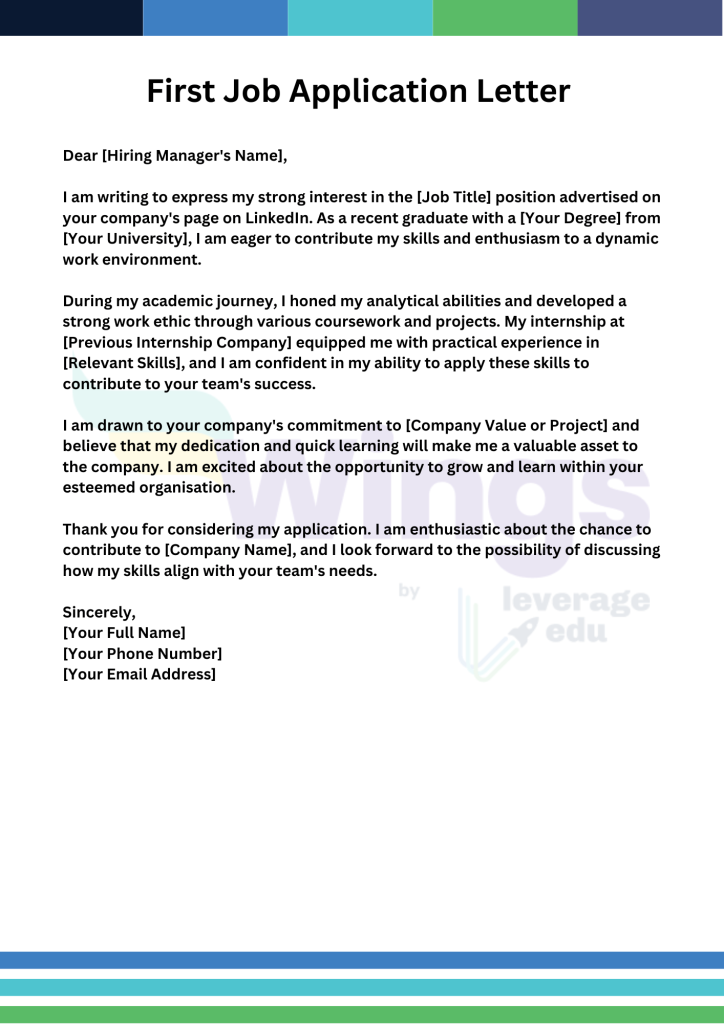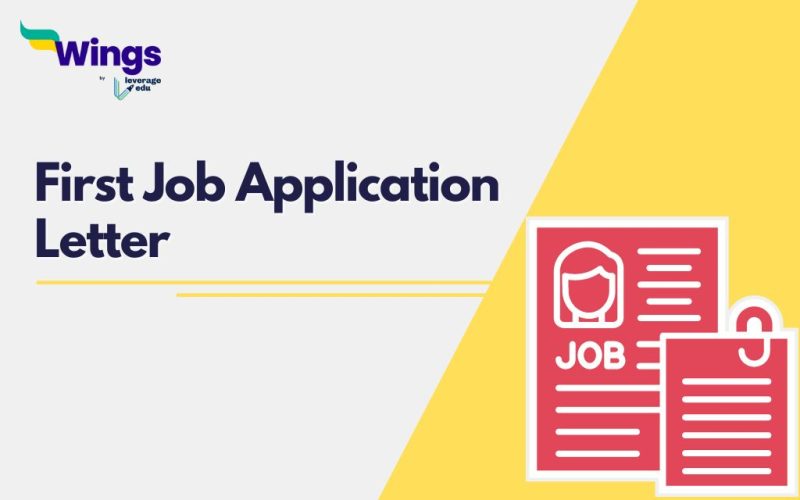The first job is always special for everyone. Embarking on the journey to your first job can be both exciting and nerve-wracking. One crucial step in this process is composing an effective job application letter that introduces you to your potential employers. Your first job application must be both appealing and strong to impress the hiring managers. To help you leave a positive impact on your potential employer, we have provided essential tips to write an effective first job application letter. In addition, we have also included sample letters for your reference. Keep reading!!
This Blog Includes:
Also Read: Self-Introduction on First Day of Work Sample
Number of Ways to Create an Effective First Job Application Letter
Below we have listed a number of ways to create a compelling first job application. Start with a concise introduction, highlighting your enthusiasm and the position you are applying for. Clearly articulate your skills and experiences relevant to the job. Remember, brevity is key – keep it focused.
1. Research
Before diving into writing your first job application letter, take the time to thoroughly research the company and the specific job role you are applying for. Understand the work culture, values, and mission. Tailoring your application to the unique aspects of the company and the requirements of the job demonstrates a genuine interest in becoming a part of their team.
Also Read: Top 15 Chemistry Interview Questions and Answers PDF
2. Create a Good Format and Structure
A well-organized letter reflects your professionalism. Follow a standard format, including a header with your contact information, a salutation addressing the hiring manager, an introduction, body paragraphs, and a closing statement. Keep your letter clear and concise, avoiding unnecessary details.
Look for creative ideas to refer to for a good job application letter. You may as well download a free template for your first job application letter, this will enable you to save your energy from losing it to the format and structure creation and you will be able to spend more time on creating good content for your first job application.
Also Read: English Literature Interview Questions
3. Writing the Introduction
Ideally, your letter must begin witty addressing the hiring manager. The opening paragraph is your opportunity to capture the employer’s attention. Express genuine enthusiasm for the position and briefly introduce yourself. Mention how you learned about the job opening and why it caught your interest.
You can address your hiring manager often in the letter for a personalized approach. Personalizing your application shows your initiative and sincere interest in the position. Mention specific details about the company that resonated with you, such as recent achievements or projects.
4. Body Paragraphs
Dedicate a paragraph to each key qualification or skill required for the job. Provide specific examples from your educational experiences that demonstrate your proficiency. Use this section to showcase your understanding of the role and how your unique skills align with the company’s needs.
Also Read: How To Ace Your Self Introduction in Interview!
5. Write About Your Achievements
Highlight your past achievements and contributions. Clearly articulate why you are the ideal candidate for the position. Connect your skills, experiences, and achievements to the specific requirements outlined in the job description. Demonstrate a comprehensive understanding of how your background aligns with the company’s goals.
6. Concluding Paragraph
Summarise your interest in the position and express your eagerness for an interview. Also, thank the employer for considering your application. A strong closing paragraph leaves a positive and lasting impression.
Also Read: Self-Introduction for Teacher Interview
First Job Application Letter Samples
Here are two samples for you to ease your process of creating the first job application letter. Read below to learn more about the entry-level job application letters.
Sample 1
| Dear [Hiring Manager’s Name], I am writing to express my interest in the [Job Title] position listed on your company’s careers page. As a recent graduate with a degree in [Your Field] from [Your University], I am eager to kickstart my professional journey and believe that my skills align well with the requirements of the role. Throughout my academic journey, I have developed a solid foundation in [Relevant Skills] and successfully applied them in real-world projects. My internship at [Internship Company’s Name] not only sharpened my [Key Skill] but also instilled in me the importance of collaboration and adaptability to succeed in a professional setting. I am particularly attracted to your [Company Name] because of its innovative approach to [/Project Focus] and the reputation for fostering growth in its employees. I am confident that my strong communication skills, attention to detail, and passion for [Relevant Industry/Field] make me a suitable candidate for this position. Thank you for considering my application. I am excited about the prospect of contributing to your team and am available at your earliest convenience for an interview. Best Regards, [Your Full Name] [Your Phone Number] [Your Email Address] |
Also Read: Self Introduction Interview Sample for Experienced Person
Sample 2

Also Read: Self-Introduction for Teacher Interview
Mistakes to Avoid While Writing Your First Job Application Letter
Below are the mistakes that leave a significantly negative impact on your application letter, if neglected. Take note of the following list to mark an impression on your potential employers.
Neglecting Typos and Grammatical Mistakes
For this, proofread your letter thoroughly to catch any typos or grammatical mistakes. Attention to detail is crucial, and errors can create a negative impression.
Lack of Research
As discussed above, researching the company to align with the company’s goals and position requirements is extremely helpful. Failing to research the company and the role you are applying for can make your letter seem uninformed. Mention specific details about the company to demonstrate your genuine interest.
Ignoring the Job Requirements
Clearly address how your skills and experiences align with the job requirements. Ignoring key qualifications may lead the employer to question your suitability for the position.
Also Read: 1-Minute Self-Introduction Job Interview
Being Too Informal or Formal
Do not adopt an excessively formal tone or informal tone as both of these extremes are not good for your first job application letter. Find the right balance in tone. While it is a professional document, being too formal can make you seem distant. Conversely, being overly casual might be perceived as unprofessional.
Adding Too Lengthy and Distractive Content
Keep your letter concise and focused. Avoid unnecessary details or unrelated information. Recruiters often appreciate brevity and clarity.
Forgetting to Leave a Call to Action (CTA)
Clearly express your interest in moving forward in the hiring process. Include a call to action, such as expressing your availability for an interview, to prompt the next steps.
Ensure that your contact information is up-to-date. It sounds basic, but it’s essential to make it easy for employers to reach you.
Also Read: Self Introduction in English for BPO Interview (Check Sample)
Check out our popular Career Counselling topics:
FAQs
A cover letter is often attached to a resume to complement it with the required skills and information that may not be listed in a resume. A job application letter is a comprehensive alternative to both the resume and the cover letter. It covers all the detailed information that is listed in a resume and a cover letter. It is to be noted that a cover letter, resume and job application letter – all follow different formats.
A job application must be written in a way that is compelling and covers all your skills and experiences in a decent and normal tone, neither too formal nor too informal tone. A good job application letter must address the recipient at the beginning and then mention the purpose of the letter in the first paragraph, following it should be the body of the application letter and the end should be a summary of the whole letter. The letter should end with the sender’s continued interest in the job.
Write your job application letter in such a way that addresses the hiring manager at the top. You must then express your strong interest in the job in the leading paragraph and write a paragraph of the body for each skill required for the job and how you can offer to fulfil that need. End your letter with a brief summary and a generous thank you note.
Stay in touch with Leverage Edu’s career counselling page to make a lasting impression in your job interviews!!


 One app for all your study abroad needs
One app for all your study abroad needs












 60,000+ students trusted us with their dreams. Take the first step today!
60,000+ students trusted us with their dreams. Take the first step today!